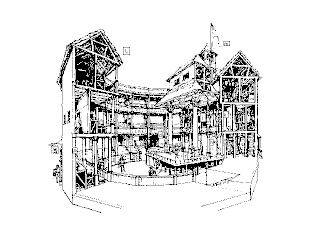Press here to know where is the house:
http://www.panoramio.com/photo/15865313

William Shakespeare (baptised 26 April 1564 – 23 April 1616) was an English poet and playwright, widely regarded as the greatest writer in the English language and the world's preeminent dramatist.[1] He is often called England's national poet and the "Bard of Avon" (or simply "The Bard"). His surviving works consist of 38 plays,[b] 154 sonnets, two long narrative poems, and several other poems. His plays have been translated into every major living language, and are performed more often than those of any other playwright.[2]
Shakespeare was born and raised in Stratford-upon-Avon. At the age of 18, he married Anne Hathaway, who bore him three children: Susanna, and twins Hamnet and Judith. Between 1585 and 1592, he began a successful career in London as an actor, writer, and part owner of a playing company called the Lord Chamberlain's Men, later known as the King's Men. He appears to have retired to Stratford around 1613, where he died three years later. Few records of Shakespeare's private life survive, and there has been considerable speculation about such matters as his sexuality, religious beliefs, and whether the works attributed to him were written by others.[3]
Shakespeare produced most of his known work between 1590 and 1613. His early plays were mainly comedies and histories, genres he raised to the peak of sophistication and artistry by the end of the sixteenth century. He then wrote mainly tragedies until about 1608, including Hamlet, King Lear, and Macbeth, considered some of the finest examples in the English language. In his last phase, he wrote tragicomedies, also known as romances, and collaborated with other playwrights. Many of his plays were published in editions of varying quality and accuracy during his lifetime. In 1623, two of his former theatrical colleagues published the First Folio, a collected edition of his dramatic works that included all but two of the plays now recognised as Shakespeare's.
Shakespeare was a respected poet and playwright in his own day, but his reputation did not rise to its present heights until the nineteenth century. The Romantics, in particular, acclaimed Shakespeare's genius, and the Victorians hero-worshipped Shakespeare with a reverence that George Bernard Shaw called "bardolatry".[4] In the twentieth century, his work was repeatedly adopted and rediscovered by new movements in scholarship and performance. His plays remain highly popular today and are constantly performed and reinterpreted in diverse cultural and political contexts throughout the world.
The best place to eat
If you fancy eating and drinking in the place that is reputed to have served as William Shakespeare's off licence, The Vintner is for you. The fine timber-framed building has been little altered since it was built in the late-1400s and provides a handsome setting for the café bar, a restaurant and private dining in the Banquet Room.
Handy for the Royal Shakespeare Theatres and open seven days a week, the cuisine ranges from traditional English cooking through to pan European, and draws on fresh, local produce. Visitors and locals mingle cheerfully, assisted by a wine list that will take you on a challenging journey round the globe, all of which helps towards creating the high zing factor that rings around the ancient beams.
The Vintner has to be one of the busiest places in town. After some five hundred years, it's still privately owned. In 1600, John Smith traded here as a wine merchant and it's reputed that William Shakespeare came here to buy his wine. If the list which he was able to choose from then bears any resemblance to the one on offer to those who eat and drink here now, then Will certainly knew a thing or two!
The Vintner offers a modern café bar and a handsome restaurant. The Private Dining Room is an ideal setting for a wedding breakfast, a reunion, that special birthday party or a meeting of the Board perhaps? The menu, from £29.95 per person, offers a delightful three course meal, with optional champagne on arrival.
In the restaurant, they serve breakfast from 10am daily, and offer their a la carte menu all day until 10pm, with weekly-changing specials to supplement the excellent choice available on the normal bill of fare. So there is fine chicken liver pâté with toast and Greek salad with deep fried halloumi whilst main courses take in salmon fishcakes with spinach and sorrel sauce and breast of chicken roasted in lime butter with mango, mild curry sauce and basmati rice.
Puddings include an angel pie, soft meringue with whipped cream and passion fruit and sticky toffee pudding with vanilla ice cream.
For further information a visit to their Website comes as obligatory.

HotelsHoliday Inn Stratford-Upon-Avon
Situated on the River Avon and set in beautiful landscaped gardens, the 4 star Holiday Inn Stratford-upon-Avon is the perfect location for discovering the delights of Shakespeare's birthplace, while other local attractions and historical sites are within walking distance.The hotel is within easy reach of J15 off the M40 and 20 miles from Birmingham Airport and the NEC and only a short drive from the amazing Warwick Castle.All 259 refurbished bedrooms have air-conditioning, wireless internet access and tea and coffee making facilities. Renowned as an excellent meeting and conference venue and with the impressively modernised Ballroom with adjoining exhibition areas we can host events for up to 550 delegates. To dine in style, the Terrace Lounge and Bar, Riverside Restaurant and G's Bar offer excellent food to suit all tastes. Or to really unwind and recuperate, the leisure club is available for all guests to use with a wide range of first class facilities including a fully equipped gymnasium, indoor heated swimming pool, sauna and whirlpool. Discover Stratford-upon-Avon and visit the many nearby places of interest including the National Exhibition Centre, The Royal Shakespeare Theatre, Warwickshire and the Heritage Motor Centre. In compliance with English Law smoking is only permitted in designated smoking bedrooms in this hotel.

http://www.hotel.info/ShowMap_v6.aspx?longitude=-1.7005&latitude=52.1931&hmid=23175&lng=ES&pp=-1%7c23175&cpn=43



